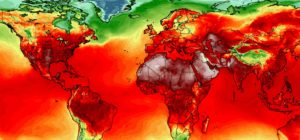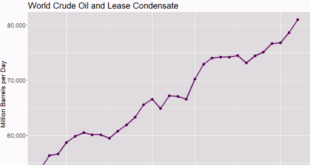
The Washington Post article, Red-hot planet: All-time heat records have been set all over the world during the past week by Jason Samenow (7/5/18), provides a nice overview of the record setting heat during this past week (map posted here copied from the article). In North America:
Montreal recorded its highest temperature in recorded history, dating back 147 years, of 97.9 degrees (36.6 Celsius) on July 2. The city also posted its most extreme midnight combination of heat and humidity.
Ottawa posted its most extreme combination of heat and humidity on July 1.
In Europe:
Excessive heat torched the British Isles late last week. The stifling heat caused roads and roofs to buckle, the Weather Channel reported, and resulted in multiple all-time record highs:
In the Middle East:
As we reported, Quriyat, Oman, posted the world’s hottest low temperature ever recorded on June 28: 109 degrees (42.6 Celsius).
Maps of temperature anomalies can be created for various time periods from NASA’s GISS Surface Temperature Analysis page. June isn’t available yet but it will be before long. Monthly Global Climate reports are available from NOAA. June isn’t available yet, but here are two highlight from May:
The contiguous U.S. May 2018 temperature was 2.89°C (5.2°F) above the 20th century average and the highest May temperature since national records began in 1895. This value exceeds the previous record set in 1934 by +0.4°C (+0.7°F).
Europe had its warmest May since continental records began in 1910 at +2.76°C (4.97°F), surpassing the previous record set in 2003 by +0.92°C (+1.66°F). May 2018 marks the first time in May that the continental temperature departure from average is 2.0°C (3.6°F) or higher.
